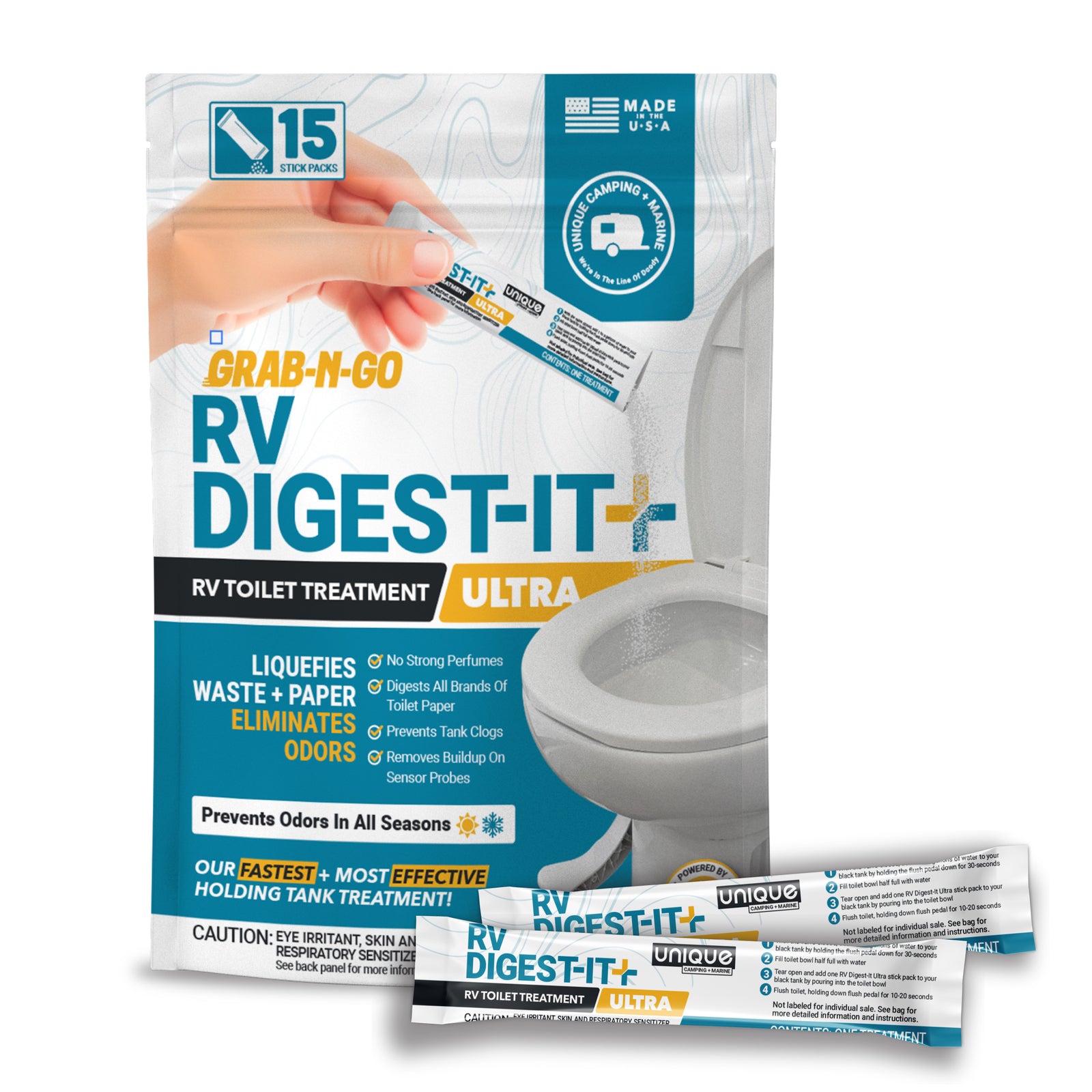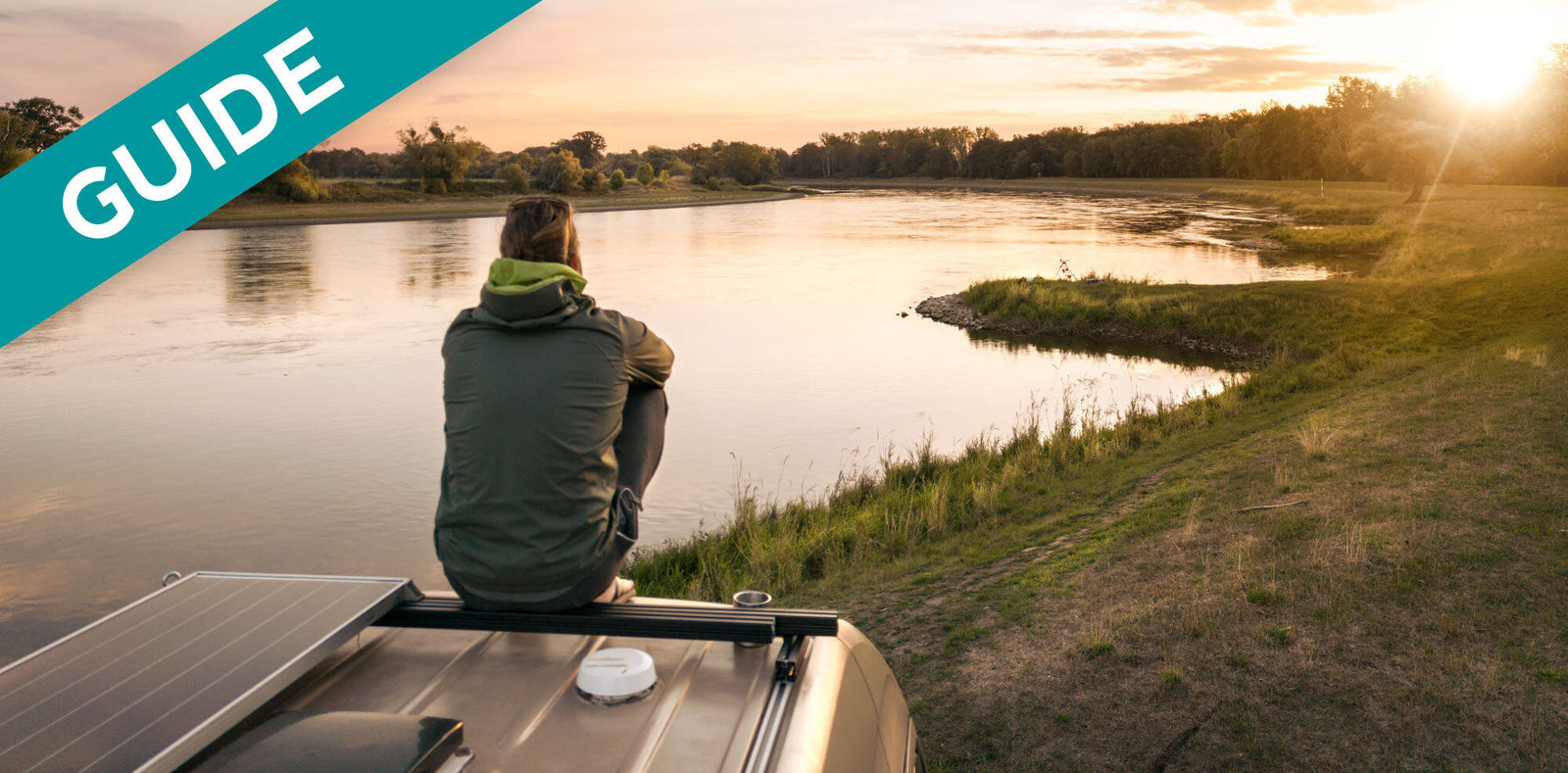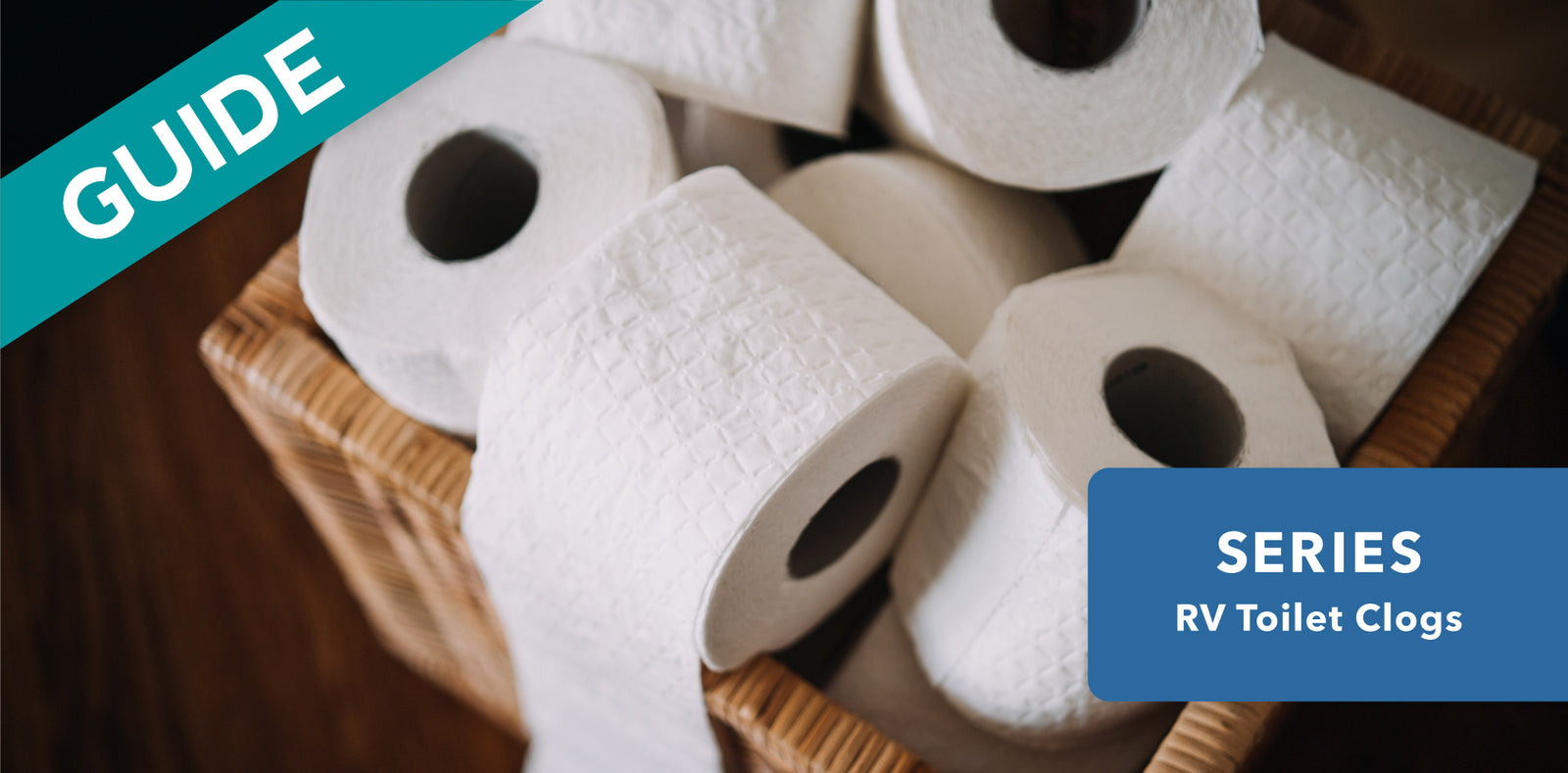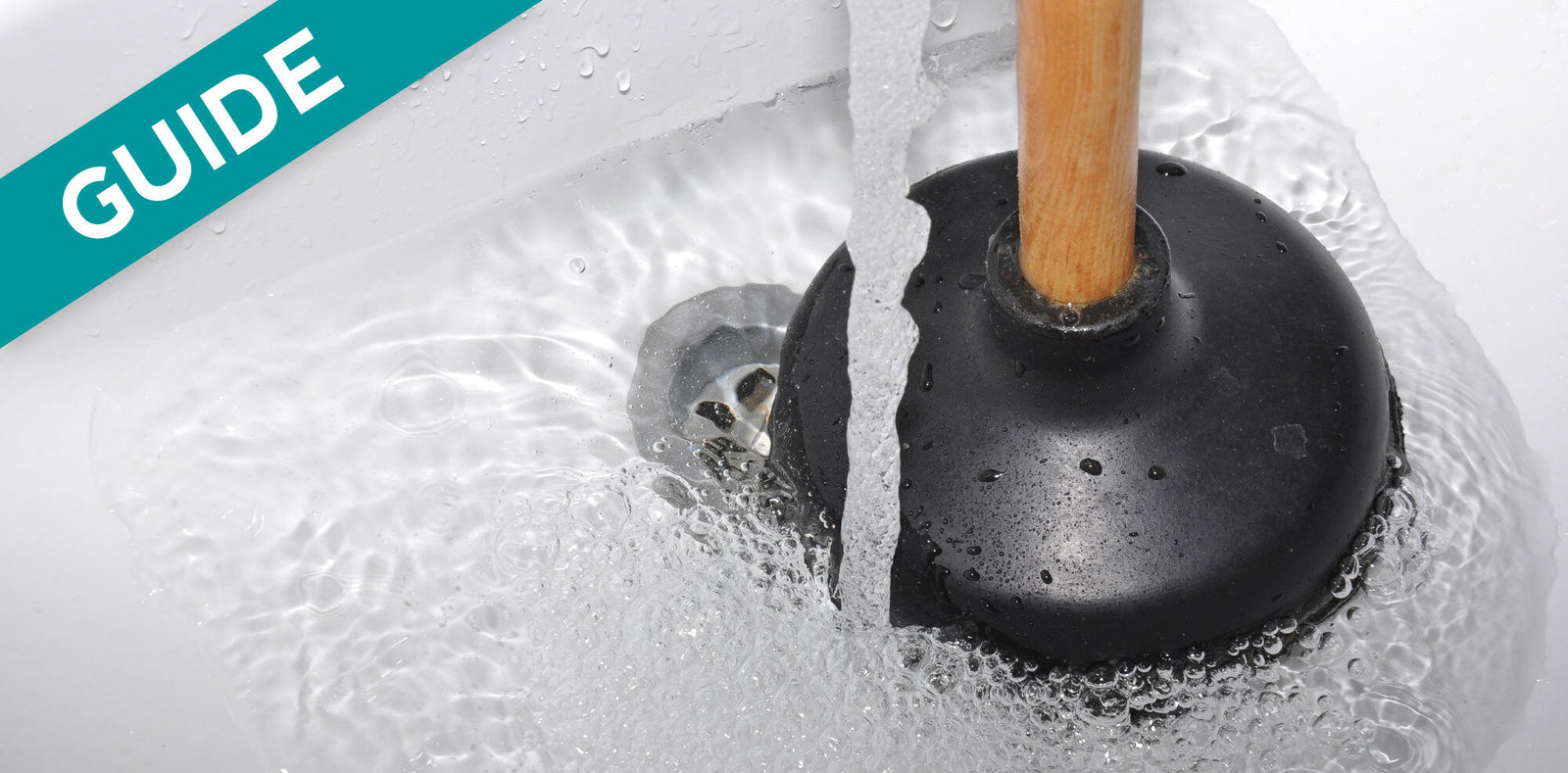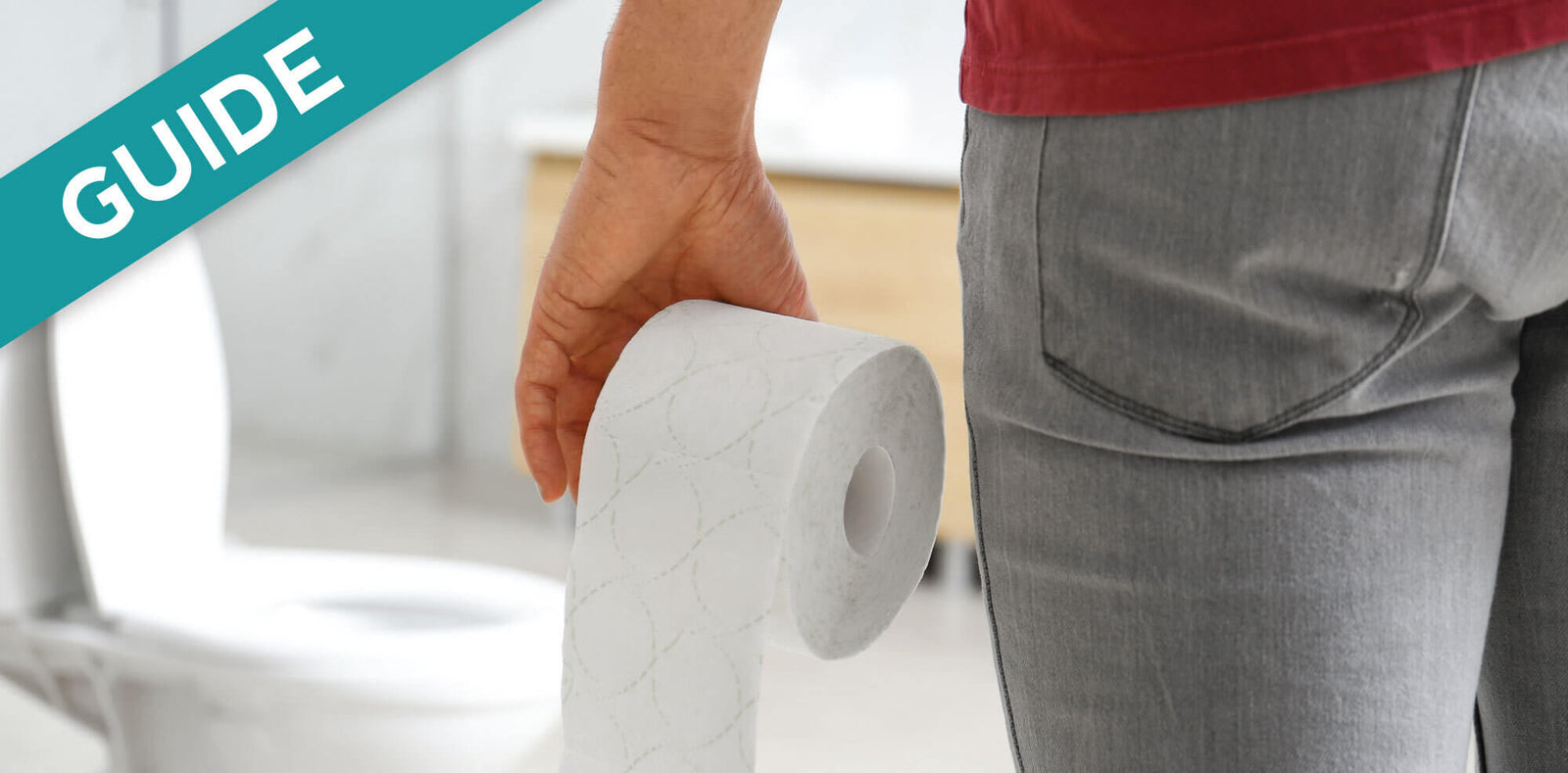
Whether you are new to RVing, or you’re an experienced veteran, you’ve likely wondered whether it is safe to poop in your RV toilet. Most commonly, this question comes as a result of hearing rumors that pooping in an RV can lead to a number of problems. However, like most rumors, this actually isn’t true.
It is completely safe to poop in an RV toilet.
In fact, you probably purchased your RV to experience the luxury of going on adventures while still enjoying the comforts of home – specifically, having a toilet of your own to use while traveling.
This guide will help you understand that you should have no fear of using your camper toilet, as long as you follow our simple set of rules and use the right products, as outlined by The Unique Method.
Key Points About Using RV Toilets
- You can safely, and confidently, poop in an RV toilet without experiencing problems.
- RV toilets and home toilets have a few distinct differences that are helpful to know.
- Using lots of water is the key to odor reduction and clog prevention in camper toilets.
- Following The Unique Method, and using a high-quality tank treatment like Unique RV Digest-It Plus Ultra, can help you enjoy worry-free trips to the bathroom in your camper.
What are the Differences Between RV Toilets and Home Toilets?
When dealing with RV toilets, it is important to understand that they function differently than home toilets. We’re going to break down some of the major differences and how they change the process of using them.
Home Toilets
Home toilets are typically hooked up to city wastewater systems or to underground septic systems.
- City wastewater systems will immediately carry the flushed waste through complex plumbing systems to a treatment plant.
- Septic systems will carry the flushed waste through the plumbing system to the septic tank. The waste will be stored as it is broken down by a colony of bacteria, allowing heavy solids to fall to the bottom, where they will remain until the tank is pumped out. The liquified waste is flushed out with additional water, or by a pump system, where it is distributed into the soil of the leach field.
RV Toilets
RV toilets have a very basic plumbing system that helps move the waste, water, and toilet paper from the toilet to the black water holding tank. It is then stored until it is time to be dumped into a sewer port at a campground or at a dump station. When dumping, you will need to attach fittings and sewer hoses to the discharge port so the contents of the black water holding tank can flow into the sewer port or dump station opening.
- Water and gravity are the only things that help waste flow down the RV toilet pipe into the black water holding tank for most RVers. Some RVs come equipped with macerator toilets, which use water and electricity to break up waste and paper mechanically, and then similarly, water and gravity help flow everything to the black water holding tank.
- RV black water holding tanks are not the same as septic tanks. RV black water holding tanks are only designed to temporarily store waste until you are able to dump the tank. On the other hand, with septic tanks, time is on your side because they can allow waste to break down for years before the contents need to be pumped out. RV black water holding tanks are only meant to hold the waste for shorter periods of time – days rather than years.
Key Differences When Using RV Toilets
When reviewing home toilets and RV toilets, the important thing to understand is that because they are set up differently, you also have to use them differently.
- Use More Water in RV Toilets: You need to be more mindful about the amount of water used in camper toilets than home toilets, since water and gravity are the only things moving the waste from the toilet to the blackwater holding tank, and eventually to the sewer. RV toilets don’t flush a predetermined amount of water, or automatically refill, so you have to manually ensure you use enough water before and after each use. The best way to do this is to hold the flush pedal down long enough so that water fills the toilet, but not enough that the ball valve opens.
- Keep RV Black Water Tanks Clean: As you repeatedly store waste in your black water holding tank, you need to deal with waste and residue that can eventually build up on the bottom and sides of the tank over time. It’s critical to make sure that lingering waste is broken down to keep everything moving in and out of the tank smoothly.
Both of these practices will help ensure that you do not deal with problematic clogs and odors in your camper. In the next section, we will discuss these two important takeaways in greater detail.
Water is the Key to Reducing Odors & Preventing Clogs in RVs
Water is the most important thing to consider when using RV toilets, and using plenty of it will help you reduce your chances of dealing with clog and odor issues down the road. Why? Because water not only acts as a natural odor barrier, but helps soften solid waste so that it doesn’t build up and create clogs.

While some people in the RVing community might suggest limiting water use while dry camping, or boondocking, to conserve tank space for longer trips, not using enough water can significantly increase your chances of dealing with wastewater problems. Let’s face it, no one wants to deal with a clogged toilet or smelly RV while enjoying a camping trip.
Here are the three best ways to ensure that you are using enough water in your RV toilet:
-
Fill your RV toilet bowl with fresh water before using it.
- When you use your camper toilet, you should fill your toilet bowl with a few inches of water before you use it.
- Using plenty of water helps prevent the waste from clinging to the sides of the bowl, and allows it to smoothly flow down the pipe when you flush the RV toilet.
-
Always keep the RV toilet bowl filled with water (except when
driving).
- Maintaining several inches of water in your RV toilet bowl can act as a natural odor barrier.
- Foul odor will not be able to rise up from the black water holding tank through the toilet line because the water in the bowl will block it.
- This is the same reason that your home toilet is designed to refill the bowl automatically after each use.
-
Flush longer to allow more water into the RV black water holding tank.
- Ideally, you should hold down your RV toilet flush pedal for a minimum of 10 seconds each time you flush.
- In addition to ensuring that the waste flows smoothly down the line, using plenty of water can also hydrate the waste-digesting bacteria in your black water holding tank, allowing for improved waste breakdown.
- Physically covering the waste with water will soften it and make it easier to break down, while odors will be suppressed by the natural water barrier.
Important Note: We know it might seem odd, but you do want certain types of bacteria in your RV black water holding tank. This good, waste-digesting bacteria plays a key role in proper waste breakdown.
For more detailed information about the benefit of having bacteria in your RV holding tanks, review our guide: Why Are Bacteria and Enzymes Good for Your RV Holding Tanks?
Implementing these three water-usage habits will help you avoid the majority of issues that you may be worried about when using your RV toilet while camping. Just remember, water is the most reliable, and immediate, way to prevent potential RV clog and odor problems.
RV Toilets: Best Practices
Using plenty of water is the first step in safely using your camper toilet, but there are a few other best practices that can help support your RV’s black water holding tank and black water plumbing system.
Key Tips for Using RV Toilets:
1. Keep Your RV Black Water Tank Valve Closed (unless actively dumping).
Keeping your RV’s black water tank valve closed prevents liquid from immediately draining from the tank. When liquid is allowed to remain, it not only keeps odors below the waterline, but it softens everything, and prevents waste and toilet paper from hardening and building up inside the tank.
If left unchecked, solid build up in black water holding tanks can eventually form a pyramid plug, blocking the RV toilet line.
For detailed information about RV pyramid plugs, or poop pyramids, please review our guides: What is an RV Pyramid Plug? and How to Get Rid of an RV Pyramid Plug.
2. Flush Only Urine, Feces, and Toilet Paper Down an RV Toilet.
RV black water holding tanks are specifically designed to hold human waste and toilet paper – only.
Flushing other items down the camper toilet like flushable wipes, feminine products, paper towels, and other items that aren’t designed to break down quickly, can lead to clogs and other potentially costly problems.
3. Do Not Use Too Much Toilet Paper in an RV Toilet.
Using too much toilet paper can cause backups and clogs in both the RV toilet line, and the black water holding tank. Be mindful, and only use the amount of toilet paper you need.
Some campers claim you can only use RV toilet paper to avoid clogs, however, all toilet paper is designed to break down quickly in water and can be used in RVs. Feel free to use your preferred toilet paper as long as you are using it with a high-quality, solid-reducing tank treatment like RV Digest-It Plus Ultra.
If you’d like more information about toilet paper usage in RV toilets, please reference our guide: Is RV Toilet Paper Necessary?
4. Treat Your RV Black Water Holding Tank With High-Quality, Bacteria- and Enzyme-Based Tank Treatment Like Unique RV Digest-It Plus Ultra.
We consider bacteria-based RV holding tank treatments the gold standard when it comes to choosing tank care products.
RV Digest-It Plus Ultra-Concentrate includes a powerful blend of bacteria and enzymes, and is designed to ensure that the waste in your tanks stays liquefied, allowing for better flow when dumping. It will also make sure your RV black water holding tank remains free from odors, misreading sensors, and clogs.
Even on short camping trips, adding a bacteria + enzyme based treatment, like RV Digest-It Plus Ultra, can make RV toilet use and black water tank dumping clean, easy, and convenient.
5.Thoroughly Rinse Your RV Black Water Holding Tank After Dumping
Rinsing your RV black water tank after each dump is a crucial step in maintaining clog- and odor-free holding tanks.
Inconvenient clogs and foul odors can arise if waste is allowed to linger in crevices, tank ledges, sensor probes, and low points in your tanks. Even in tanks that are very well maintained, some natural buildup is inevitable.
However, thoroughly rinsing your camper’s black water holding tank after each dump can significantly reduce the amount of waste and toilet paper left behind, and keep your tanks working problem-free for longer. Fortunately, proper rinsing is very easy. After dumping, simply fill your black water tank completely with fresh, clean water, then dump the tank.
The amount of waste and toilet paper that you will see leaving the black water tank can be impressive, which is why we recommend it after each dump.
For more thorough details about rinsing and deep cleaning your black water holding tanks, please review our guide: How to Deep Clean RV Black Water Holding Tanks
No Clogs, No Problems: RV Toilets & The Unique Method
Preventing RV toilet clogs and odors doesn’t need to be complicated, in fact, utilizing The Unique Method can help you safely and easily enjoy problem-free camping.
After several decades of solving RV wastewater problems, Unique Camping + Marine created a tried-and-tested system that only requires you to do two things: follow the right process, and use the right products. The steps are straightforward, and easy to follow, and their bio-enzymatic (bacteria and enzyme) product formulas breakdown solid waste, eradicate odors at the source, and take care of sensor probe maintenance simultaneously.
When you use Unique RV Digest-It Plus Ultra, you are getting the company’s strongest blend of bacteria and enzymes, providing rapid waste breakdown, complete elimination of stinky tank odors, and black tank sensors that work properly without giving false readings.
RV Digest-It Plus Ultra works with all camping styles including hookups, dry camping, and stationary units (full-timer campers).
With RV Digest-It Plus Ultra working in your black water holding tank, you can rest easy knowing your tank is being cleaned and deodorized by the strongest, and most advanced, holding tank treatment on the market.
Pooping in RV Toilets: The Final Verdict
Well, the results are in, and the final verdict is that it is safe, easy, and convenient to poop in RV toilets. Knowing the differences between camper toilets and home toilets, adding plenty of water, using RV Digest-It Plus Ultra, and following The Unique Method, will solve 99% of your RV toilet problems before they happen.
For more information about preventing issues in your black water plumbing system, please review our guide: How to Prevent Clogs In Your RV Black Water Holding Tank.

Clogged Toilet? We Can Help!
We've helped thousands of RVers unclog their toilets and tanks and we can help you too! Whats better is that we have all the tips and tricks we've used over the years organized in one easy, free downloadable PDF!
Get The Free Download
